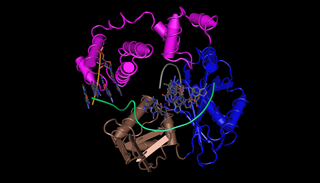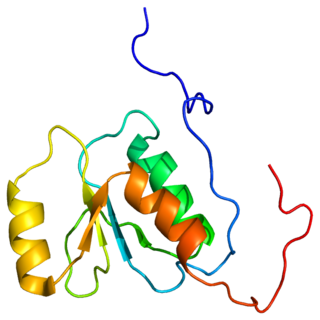DNA polymerase delta subunit 3 is an enzyme that in humans is encoded by the POLD3 gene. [5] [6] It is a component of the DNA polymerase delta complex.
DNA polymerase delta subunit 3 is an enzyme that in humans is encoded by the POLD3 gene. [5] [6] It is a component of the DNA polymerase delta complex.
POLD3 has been shown to interact with PCNA. [7] [8]

Proliferating cell nuclear antigen (PCNA) is a DNA clamp that acts as a processivity factor for DNA polymerase δ in eukaryotic cells and is essential for replication. PCNA is a homotrimer and achieves its processivity by encircling the DNA, where it acts as a scaffold to recruit proteins involved in DNA replication, DNA repair, chromatin remodeling and epigenetics.

p21Cip1, also known as cyclin-dependent kinase inhibitor 1 or CDK-interacting protein 1, is a cyclin-dependent kinase inhibitor (CKI) that is capable of inhibiting all cyclin/CDK complexes, though is primarily associated with inhibition of CDK2. p21 represents a major target of p53 activity and thus is associated with linking DNA damage to cell cycle arrest. This protein is encoded by the CDKN1A gene located on chromosome 6 (6p21.2) in humans.

A DNA clamp, also known as a sliding clamp, is a protein complex that serves as a processivity-promoting factor in DNA replication. As a critical component of the DNA polymerase III holoenzyme, the clamp protein binds DNA polymerase and prevents this enzyme from dissociating from the template DNA strand. The clamp-polymerase protein–protein interactions are stronger and more specific than the direct interactions between the polymerase and the template DNA strand; because one of the rate-limiting steps in the DNA synthesis reaction is the association of the polymerase with the DNA template, the presence of the sliding clamp dramatically increases the number of nucleotides that the polymerase can add to the growing strand per association event. The presence of the DNA clamp can increase the rate of DNA synthesis up to 1,000-fold compared with a nonprocessive polymerase.

Ku80 is a protein that, in humans, is encoded by the XRCC5 gene. Together, Ku70 and Ku80 make up the Ku heterodimer, which binds to DNA double-strand break ends and is required for the non-homologous end joining (NHEJ) pathway of DNA repair. It is also required for V(D)J recombination, which utilizes the NHEJ pathway to promote antigen diversity in the mammalian immune system.

Replication protein A 70 kDa DNA-binding subunit is a protein that in humans is encoded by the RPA1 gene.

DNA replication licensing factor MCM7 is a protein that in humans is encoded by the MCM7 gene.

Y box binding protein 1 also known as Y-box transcription factor or nuclease-sensitive element-binding protein 1 is a protein that in humans is encoded by the YBX1 gene.

Growth arrest and DNA-damage-inducible protein GADD45 alpha is a protein that in humans is encoded by the GADD45A gene.

DNA polymerase lambda, also known as Pol λ, is an enzyme found in all eukaryotes. In humans, it is encoded by the POLL gene.

Replication factor C subunit 1 is a protein that in humans is encoded by the RFC1 gene.

Replication factor C subunit 4 is a protein that in humans is encoded by the RFC4 gene.

Replication factor C subunit 2 is a protein that in humans is encoded by the RFC2 gene.

Replication factor C subunit 3 is a protein that in humans is encoded by the RFC3 gene.

Replication factor C subunit 5 is a protein that in humans is encoded by the RFC5 gene.

DNA polymerase delta subunit 2 is an enzyme that in humans is encoded by the POLD2 gene. It is a component of the DNA polymerase delta complex.

Polymerase delta-interacting protein 2 also known as Polymerase delta-interacting protein of 38 kDa (PDIP38) is encoded by the POLDIP2 gene in humans.

Chromosome transmission fidelity protein 18 homolog is a protein that in humans is encoded by the CHTF18 gene.

DNA polymerase delta subunit 4, also known as DNA polymerase delta subunit p12, is a protein that in humans is encoded by the POLD4 gene. It is a component of the DNA polymerase delta complex.

DNA polymerase epsilon catalytic subunit is an enzyme that in humans is encoded by the POLE gene. It is the central catalytic subunit of DNA polymerase epsilon.

Polymerase (DNA-directed), epsilon 4, accessory subunit is a protein that in humans is encoded by the POLE4 gene.